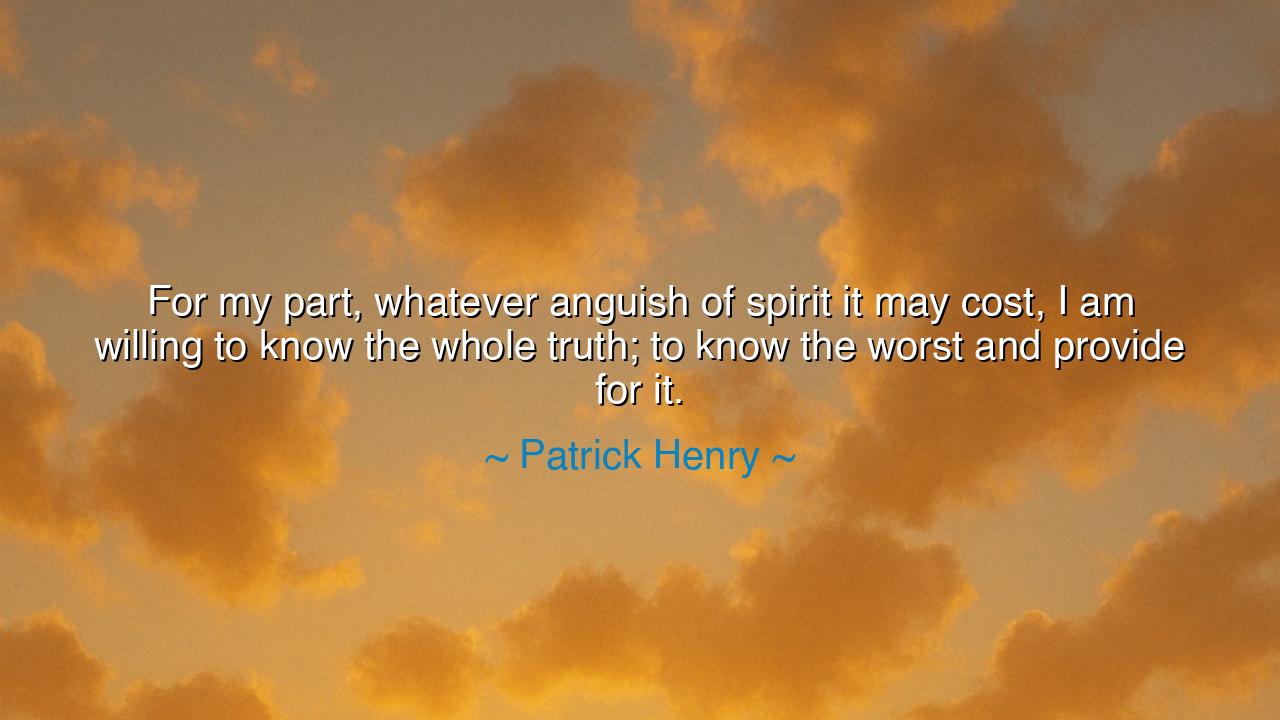
For my part, whatever anguish of spirit it may cost, I am
For my part, whatever anguish of spirit it may cost, I am willing to know the whole truth; to know the worst and provide for it.






"For my part, whatever anguish of spirit it may cost, I am willing to know the whole truth; to know the worst and provide for it." So thundered Patrick Henry, one of the great voices of the American Revolution, whose fiery words stirred men’s hearts to action. In this declaration lies not only political resolve, but eternal wisdom: that to face truth in its fullness, even when bitter, is better than to rest in illusions. For illusions soothe, but they betray; truth wounds, but it prepares. The courageous soul chooses knowledge, even if it brings pain, over ignorance, which breeds ruin.
This statement was born from Henry’s famous speech at the Virginia Convention in 1775, where he warned against the danger of false hope. Many wished to believe that reconciliation with Britain was still possible, that peace could be preserved without sacrifice. But Henry, seeing more clearly, declared that such hope was a snare. The worst—war, suffering, bloodshed—must be faced honestly, for only then could men prepare and prevail. His willingness to bear the anguish of spirit was not despair, but the strength to look upon danger with unflinching eyes.
The ancients, too, honored this courage. Did not the Oracle at Delphi tell seekers: “Know thyself”? And what is this but a summons to face the whole truth, even the painful truth, of one’s soul? To deny weakness is to be ruled by it. To ignore fate is to be crushed by it. But the man who knows his darkest truths is the man who can arm himself against them. In war, in love, in life, the principle remains: only by knowing the worst can one prepare for the best.
History bears further witness. When Winston Churchill stood before Parliament in 1940, he did not promise comfort. He gave his people not dreams, but the harsh reality of their plight. “I have nothing to offer but blood, toil, tears, and sweat,” he said. Like Henry, he was willing to tell the truth, however bitter, because only such truth could steel a nation’s heart. And his honesty, though grim, became the seed of hope and resilience. To deny the worst would have been to leave his people unprepared. To name it gave them strength.
The lesson is clear: to refuse to face truth is to invite destruction. The man who will not see the storm coming is the first to be swept away. The woman who denies her illness is the one most endangered by it. The society that hides from its injustices is the one consumed by them. But those who dare to know, even when it burns their spirit, are those who endure and overcome. For knowledge, even painful knowledge, is power.
Practically, this means cultivating bravery in small things as well as great. Look honestly at your failures instead of hiding them. Name your fears instead of pretending they do not exist. Speak the truth even when it is unwelcome. If hardship looms, do not flee into denial; instead, prepare your heart and your hands to meet it. This is the path of strength, the way of those who rise rather than fall.
So remember, children of tomorrow: "to know the whole truth, to know the worst, and provide for it" is not despair, but valor. Do not be afraid of anguish, for anguish is the price of wisdom. Better a bitter truth that arms you than a sweet lie that enslaves you. Patrick Henry’s words are a summons across the centuries: face reality with open eyes, embrace truth with steadfast heart, and in that knowledge find the strength to prevail.






LTLe Tuan
I can appreciate the resolve in Patrick Henry's statement, but I wonder if there’s a limit to how much truth one can bear. Is it possible to know the worst and still maintain hope or strength? Does confronting the worst always lead to preparedness, or can it leave us paralyzed by fear? How do we prepare for the worst without letting it overwhelm us emotionally or mentally?
LNTien Luc Nguyen
This quote speaks to the courage it takes to face unpleasant truths, but it also raises an important question: is it always necessary to know the whole truth? Sometimes, partial truths or a bit of ignorance might actually help us maintain peace of mind or avoid unnecessary distress. How do we decide when it's essential to seek the whole truth and when it's better to be content with what we know?
TDNguyen Thanh Dat
I admire Patrick Henry’s resolve to face the truth no matter the cost, but I wonder if this mindset is always healthy. Can knowing the worst sometimes lead to unnecessary suffering? Or does it empower us to take action and plan accordingly? How do we find a balance between being prepared for the worst and protecting our mental well-being from excessive worry?
TKThe Kiet
This quote really makes me think about the price of truth. We often say we want the truth, but are we truly prepared for the emotional toll it can take? Patrick Henry's words suggest that the willingness to face the worst is crucial for progress, but what happens when the truth becomes too overwhelming to handle? Is it always better to know the full extent of a situation?
PNDuong Dang Phuong Nam
Patrick Henry’s commitment to facing the truth, no matter how difficult, is admirable but also deeply challenging. It makes me question—how many of us are truly ready to confront the harsh realities of life, whether personal or societal? Is the pursuit of truth always worth the anguish it might bring, or is there a point where ignorance might be a form of self-preservation?